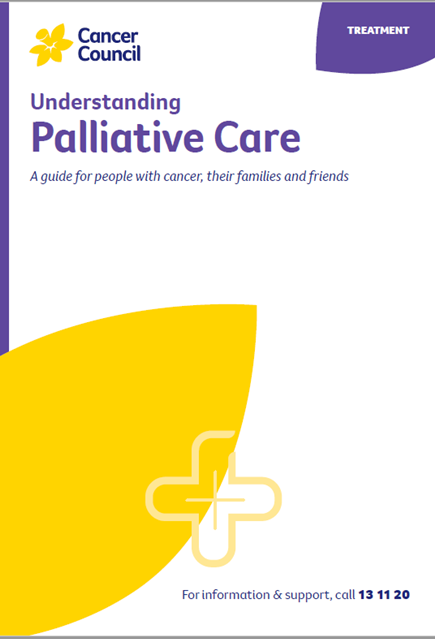- Home
- Lung cancer
- Treatment
- Palliative and supportive care
Palliative treatment for lung cancer
If the cancer is advanced when it is first diagnosed or comes back after treatment (recurrence), your doctor will discuss palliative treatment for any symptoms caused by the cancer. This is also known as supportive care. They may refer you to a palliative care specialist.
What is the aim of palliative treatment?
Palliative treatment aims to manage symptoms without trying to cure the disease. It can be used at any stage of advanced lung cancer to improve quality of life and does not mean giving up hope. In fact, palliative treatment can help some people with advanced lung cancer to live well and with few symptoms for many months or years.
How can palliative treatment relieve the symptoms?
Ways that symptoms may be relieved include:
- having palliative drug therapies (chemotherapy, immunotherapy and targeted therapy), radiation therapy and surgery to slow the spread of cancer and control symptoms such as pain or breathlessness
- draining any fluid to help prevent it building up again. Find out more about managing symptoms.
Palliative treatment is one aspect of palliative care, in which a team of health professionals aims to meet your physical, emotional, cultural, spiritual and social needs and those of your family or carer.
Learn more about palliative care and living with advanced cancer, and listen to our advanced cancer podcast.
→ READ MORE: Managing symptoms for lung cancer
Video: What is palliative care?
Watch this video to see how palliative treatment aims to manage symptoms and improve people’s quality of life without trying to cure the disease.
Podcast: Treatment Options for Advanced Cancer
Listen to more of our podcast for people affected by advanced cancer
More resources
Dr Malinda Itchins, Thoracic Medical Oncologist, Royal North Shore Hospital and Chris O’Brien Lifehouse, NSW; Dr Cynleen Kai, Radiation Oncologist, GenesisCare, VIC; Dr Naveed Alam, Thoracic Surgeon, St Vincent’s Hospital, Epworth Richmond, and Monash Medical Centre, VIC; Helen Benny, Consumer; Dr Rachael Dodd, Senior Research Fellow, The Daffodil Centre, NSW; Kim Greco, Specialist Lung Cancer Nurse Consultant, Flinders Medical Centre, SA; Caitriona Nienaber, 13 11 20 Consultant, Cancer Council WA; Marco Salvador, Consumer; Janene Shelton, Lung Foundation Australia – Specialist Lung Cancer Nurse, Darling Downs Health, QLD; Prof Emily Stone, Respiratory Physician, Department of Thoracic Medicine and Lung Transplantation, St Vincent’s Hospital Sydney, NSW; A/Prof Marianne Weber, Stream Lead, Lung Cancer Policy and Evaluation, The Daffodil Centre, NSW.
View the Cancer Council NSW editorial policy.
View all publications or call 13 11 20 for free printed copies.

